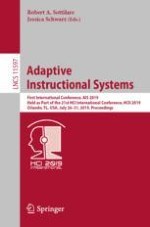2019 | OriginalPaper | Buchkapitel
Foundational Principles and Design of a Hybrid Tutor
verfasst von : Andrew J. Hampton, Arthur C. Graesser
Erschienen in: Adaptive Instructional Systems
Aktivieren Sie unsere intelligente Suche, um passende Fachinhalte oder Patente zu finden.
Wählen Sie Textabschnitte aus um mit Künstlicher Intelligenz passenden Patente zu finden. powered by
Markieren Sie Textabschnitte, um KI-gestützt weitere passende Inhalte zu finden. powered by
